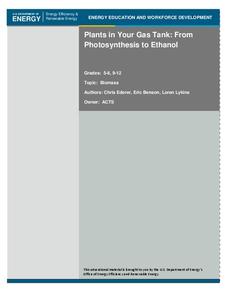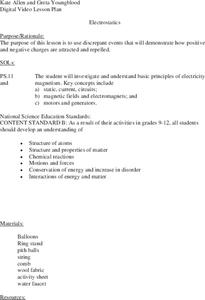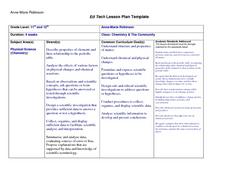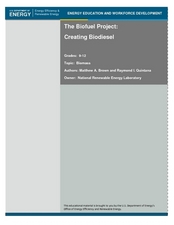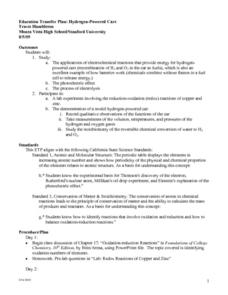Santa Monica College
The Density of Liquids and Solids
There are underwater rivers that flow on the ocean floor thanks to a difference in density. Scholars learn about the density in both liquids and solids in the second activity of an 11-part series. They then determine the density of...
Curated OER
Lead and Mercury Ion Catalase Inhibition
Students participate in a laboratory investigation in which they observe the effect of temperature and pH on enzyme activity. Students also examine exposure to heavy metal ions and the effect that may have on enzyme activity.
Curated OER
Addition Polymerization: Preparation of Polystyrene Using Two Types of Initiators
Advanced chemistry classes compare the polymerization of styrene using two different initators: benzoyl peroxide and aluminum chloride. Once they synthesize polystyrene, they compare the two producet for melting point and density. There...
Chicago Botanic Garden
Carbon, Greenhouse Gases, and Climate
Climate models mathematically represent the interactions of the atmosphere, oceans, land, sun, surface, and ice. Part two in the series of four lessons looks at the role greenhouse gases play in keeping Earth warm and has participants...
LABScI
Atomic Structure and the Periodic Table of Elements: The Secret Agent Lab
Food always gets attention! Model atomic structure using fruit loops to represent the subatomic particles. After building models, scholars create ionic bonds using their models. Finally, they use these concepts to create a periodic...
Virginia Department of Education
Molar Heat of Fusion for Water
How can you describe heat of fusion in a way the class understands and relates the importance of this concept to present day issues? In this third lesson of the series, learners conduct an experiment, demonstrating the flow of heat...
Virginia Department of Education
Heat Transfer and Heat Capacity
It's time to increase the heat! Young chemists demonstrate heat transfer and heat capacity in an activity-packed lab, showing the transitions between solid, liquid, and gaseous phases of materials. Individuals plot data as the...
Curated OER
Proteins
Vocabulary that is essential to this topic is introduced and defined at the start of this slide show. The following slides help students understand proteins and their use and involvement in everyday substances. Great diagrams help your...
Curated OER
Proteins
As long as you have some support information to answer questions that may come up from students, this is an excellent PowerPoint to cover almost all aspects of protein structure and ionization. The sequence of slides has great...
Curated OER
Elements Commercials
Student teams use a digital camcorder and iMovie to create a commercial about an element. They also use the Internet and their textbook to gather the following information about their element: the name, the symbol, the atomic number, the...
Salt River Project
How Do We Clean Polluted Water?
How do we clean up oil spills and other pollutants in the water? Explore water treatment strategies with a set of environmental science experiments. Groups remove oil from water, work with wastewater treatment, and perform a water...
Curated OER
The Nature of Salt
High schoolers record information from the periodic table for sodium and chloride. They determine whether salts are molecular or ionic compounds, along with sodium chloride's molecular weight, and relative weights
Curated OER
Plants in Your Gas Tank: From Photosynthesis to Ethanol
Explore ethanol and how it is produced. Young scientists investigate photosynthesis and fermentation to the concept of conservation of energy and mass. They discuss the environmental and economical benefits of ethanol as a fuel additive.
Kenan Fellows
What Is Heat?
If objects have no heat, how do they can gain and lose it? Scholars experiment with heat, temperature, and specific heat of various substances. They create definitions for these terms based on their own conclusions to complete the fourth...
Purdue University
Design of a Door Alarm
How does electricity work? Budding scientists explore the concepts of electrical currents and open and closed circuits with class discussion and a hands-on activity using a battery to turn on a light bulb. Learners also make predictions...
Curated OER
Electrostatics
Middle schoolers examine ways positive and negative charges are attracted and repelled by watching teacher demonstrations, and complete activity sheet related to classroom demonstration activities to prove proficiency of knowledge of...
Curated OER
Chemistry & The Community
Students complete a Webquest which investigates the chemistry in items such as shampoo. They research the Internet, perform a lab experiment, and write a scientific lab report with their findings. Upon completion of the activities, the...
Curated OER
Making Molecules
In this making molecules worksheet, students complete a table of elements with their symbol, atomic number, atomic mass, number of protons, number of electrons, period and group. Students then make models using pipe cleaners and beads of...
Curated OER
Water Resource Engineering
Students examine solubility and the significance of water. In this aqueous solution lesson plan students complete a lab activity on soil profiles.
Curated OER
Acids and Bases: Together again!
High schoolers identify principles behind acid-base reactions. They predict factors that may affect an acid-base reaction. Students identify questions and concepts that guide scientific investigations.
Curated OER
The Bio-fuel Project: Creating Bio-diesel
Students investigate bio-fuel. In this investigative lesson, students create bio-fuel from vegetable oil waste. Students will analyze, predict, collect and synthesize data from their experiments with bio-fuel.
Curated OER
Convection Activities
Students conduct a series of hands-on activities to demonstrate that heated air expands and that warm air rises because it is less dense.
Curated OER
Hydrogen Powered Cars
Students apply the principles of chemistry to investigate the concept of how a hydrogen powered car works. They study the electrochemical reactions that provide the energy source. Students also record observations in the functioning of a...
Curated OER
The Great Heat Escape
Students observe a demonstration on the role of thermal conductivity in heat transfer. In this thermal conductivity lesson, students design and conduct an experiment to compare the thermal conductivity of four substances....














